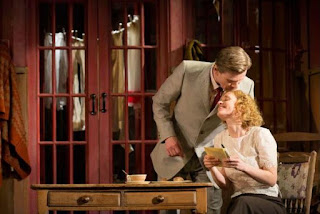Strange indeed: I made sure to book a Sunday matinee of Strange Interlude, having heard that Eugene O'Neill's play is meant to run at five hours, and that the National were hoping to bring their production in at under four. As it turns out, Simon Godwin manages to get it down to a manageable but still hefty 3 and a quarter, but this epic family drama still struggles to justify the time it demands of the audience. The story follows Nina (Anne-Marie Duff,) devastated after the death of her fiancé Gordon in the First World War. Not having had the chance to consummate their relationship, her frustration manifests itself as sex with other wounded veterans. This stops when she's persuaded to marry the gormless Sam (Jason Watkins) whom she hopes to learn to love and raise children with. But this too will prove a problem when she discovers something about her new husband even he doesn't know: A family history of insanity that would almost certainly be passed on to his children.
The central event of the narrative is the solution Nina comes up with: To get impregnated by their friend Ned (Darren Pettie) so that Sam can raise a child he thinks is his own, without the fear of passing on the faulty gene. But though successful, what is meant to be a rather clinical plan goes awry when she falls in love with Ned, and we follow decades of her dance in and out of love.
Godwin has got a strong cast at his disposal and Duff is powerful in the central role, but she's far from a sympathetic character. Indeed, apart from Sam, the patsy of the story (Watkins presumably won't accept a role that doesn't include a dodgy wig) there's nothing approaching a likeable character. And even he's too wet to root for, even naming "his" son (Wilf Scolding) after Gordon, the dead love his wife stillvholds up as an ideal years later.
Godwin has approached the rather overwrought material by playing a lot of it for laughs not intended by the writer, particularly in the asides to the audience that every single character makes, and which take up a disproportionate amount of the play. Most successful at this is Charles Edwards as Charlie, an older, probably gay man who's been desperately but chastely in love with Nina since the opening scene. He's a constant presence in her life, always bemoaning the fact that she sees him as a replacement for her dead father rather than a lover, and serving as a sort of outside voice, commenting on her romantic dalliances but never quite understanding what's going on as well as he thinks he does.
This borderline tongue-in-cheek take on the play's excesses is successful enough but not so much as to rescue Strange Interlude. I stayed to the end but Ian left at the interval, with the fair-enough comment that he didn't care what happened to any of these people anyway. I had toyed with giving up myself but after the turgid opening the first half did improve and it does keep livening up - although as often happens in the Lyttelton, impressive sets contribute a lot to this. It's Soutra Gilmour's turn to provide them, and the combination of a revolve and some of the bigger scene changes we're used to in this theatre make for a visual spectacular, especially in the second half. But this lengthy, single-minded play (for a story that covers the late 1910s to the late 1940s it doesn't take in much of the difficult times America went through with the Depression and WWII) is here receiving a better production than it probably deserves.
Strange Interlude by Eugene O'Neill is booking in repertory until the 31st of August at the National Theatre's Lyttelton.
Running time: 3 hours 15 minutes including interval.




No comments:
Post a Comment